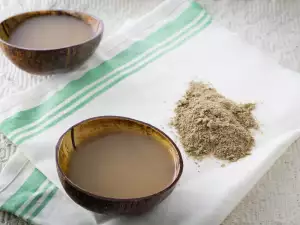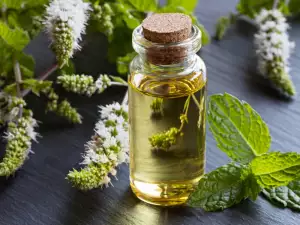In antiquity the rosemary plant was dedicated to the goddess Aphrodite and symbolized fidelity. Rosemary became a component of one of the oldest perfumes, produced since the 13th century. Due to its many beneficial properties, this amazing herb is a component of the mixture of spices and herbs, as well as an important raw material for perfumery, cosmetics and pharmacy.
In ancient times, the Greeks and Romans considered rosemary sacred and used it for a variety of purposes - religious and domestic, and learned to extract essential oil from the plant.
In the Mediterranean, rosemary leaves and the essential oil were used for culinary purposes, and in Egypt the plant, as well as extracts from it, had a major use for incense in various ceremonies. Nowadays, the use of rosemary essential oil can be found in all directions - as a medicine, a beauty product, for culinary use and for aromatherapy. Its versatile use is necessary because of its composition and beneficial properties.
Chemical composition and properties of rosemary oil
Rosemary oil has a strong refreshing herbal aroma and is colorless and watery in consistency.
The main chemical components that make up rosemary oil are: pinene, camphene, limonene, borneol, camphor, cineole, tannins and others.
They give it powerful antiseptic properties. This extract has anti-inflammatory and regenerating properties thanks to its ingredients. Applied to the skin, the oil successfully copes with puffiness and swelling. It is also used in the treatment of dermatitis, eczema and acne.
Rosemary essential oil also has strong pain-relieving properties, it can soothe spastic pain. Therefore, it is used to stimulate the nervous system in case of paralysis and disorders of individual functions - speech, motor and others.
The strong anti-inflammatory properties of the oil make it suitable for use in arthritis, osteochondrosis, neuritis, tired eyes. Its use improves the functions of the stomach, helps to clear the kidneys stones.
Diuretic properties of rosemary oil are useful for reducing water retention in the body, regulating the menstrual cycle, soothing premenstrual symptoms.
Obtaining rosemary essential oil

Rosemary essential oil of the highest quality is obtained from the flowering tops of the plant by the distillation method.
It is strong, very concentrated and is never used pure, but diluted with other ingredients, most often in tandem with other essential oils.
Making Homemade Rosemary Oil
Rosemary oil is usually purchased ready-made, but can also be made at home. All you need are sprigs of the plant and olive oil. The steps to extract the extract are easy to follow.
- Wash the rosemary sprigs well and let them dry completely;
- They are placed in a container without removing parts of the plant, because everything is usable;
- Completely cover the rosemary with olive oil and cover the container;
- The container with the oil and rosemary is left in a warm and dark place to macerate and rest for at least a month;
- The finished oil is strained and placed in a glass jar.
By following these simple guidelines, rosemary oil is obtained, a hundred percent natural, ecological product.
Benefits of rosemary essential oil

Nowadays, many therapeutic ointments and cosmetics contain rosemary essential oil. And this is no accident, as it is one of the essential oils for which there is already a lot of research on its benefits. Here is one of them:
Rosemary essential oil for hair loss and alopecia
Rosemary essential oil stimulates the follicles and this way hair grows longer and stronger. It slows down premature graying of hair and hair loss. The oil helps to thicken the hair after regular use. Massaging the scalp regularly with rosemary oil nourishes the scalp and removes dandruff.
Improving cognitive function with rosemary
Rosemary is traditionally associated with memory and mental sharpness. Aromatherapy with rosemary essential oil improves both cognitive abilities and general mood. Higher concentration improves results.
Rosemary oil against stress
A few drops of the oil in an aromatherapy diffuser can help relieve stress, regain activity and energy. Inhaling a combination of rosemary oil and lavender oil for five minutes significantly reduces salivary cortisol levels. Therefore, rosemary essential oil is often used in aromatherapy to improve mood.
Rosemary oil to strengthen the immune system
Massaging and diffusing rosemary essential oil can improve immunity as it increases cortisol levels in our body and protects against oxidative stress. A blend of essential oils, including rosemary oil, enhances the body's anti-inflammatory and immunomodulatory responses. So regular use or inhalation of the oil will help strengthen the immune system.
Rosemary essential oil against pain
Rosemary extract relieves pain in various situations. It is most often used for headaches, muscle pains, rheumatism and arthritic complaints.
Rosemary oil uses

One of the main uses of rosemary oil is that it is an excellent anti-aging agent. If mixed with peppermint and then applied to the skin, it has an immediate and better effect than any cream. It relaxes the skin and allows skin cells to hydrate, improving your appearance in minutes. Many people use rosemary as a beauty therapy, as the benefits are enormous. It gives freshness, elasticity, shine, protects cells and this is due to the antioxidants in it.
Rosemary oil has soothing and anti-inflammatory properties, which is why it is widely used in sports medicine for massages of athletes who overwork themselves or have injuries. It helps to improve the general condition after being absorbed into the pores. This is the reason why it is a good alternative to reduce inflammation caused by arthritis and other ailments.
Rosemary oil has an antiseptic and antibiotic effect and is therefore used for superficial wounds, minor cuts, scrapes and other conditions. It prevents bacteria and dirt from entering the wound and infecting it. The oil is a wonderful healer and kills microorganisms so the skin can regenerate. Wounds close much faster and the site will heal completely without scarring.
Rosemary oil has long been used to improve the general condition of hair, whether it is oily or dry - have a look at rosemary oil for hair loss. It can be used to wash the hair or as an additive in the shampoo to clean the hair from the scalp to the ends of the hair.
Its use in cosmetics is increasingly extensive in many treatments.
Rosemary oil is suitable for treating menstrual cramps, diarrhea and constipation, it helps to eliminate fluids thanks to its diuretic properties.
Contraindications for using rosemary oil
Since this oil stimulates the nervous system, it should not be used by people who suffer from hypertension or epilepsy. It should also be avoided by pregnant women. People who have sensitive skin should also refrain from using it.
This oil is very concentrated and stimulating, too much of it should not be used. If it is not properly diluted, it can cause skin irritation, itching, burning and even inflammation. It cannot be eaten and its use must be monitored by a specialist.
Read more:




















Comments